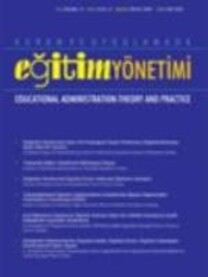Typologies of Principals: School Administration and Routine Works
Müdür Tipolojileri: Okul Müdürlüğü ve Rutin İşler
___
Akçay, C., & Başar, M. A. (2004). İlköğretim okul müdürlerinin yönetsel görevlere ayırdıkları zaman ve bunları önemli görme dereceleri. Kuram ve Uygulamada Eğitim Yönetimi, 38(38), 170-197.Aydın, A. (2016). Okul müdürlerinin bir haftasına genel bakış (Yayımlanmamış yüksek lisans tezi). Eskişehir Osmangazi Üniversitesi, Eskişehir.
Balcı, A. (2001). Etkili okul ve okul geliştirme. Ankara: Pegem A.
Balyer, A. (2012). Çağdaş okul müdürlerinin değişen rolleri. Ahi Evran Üniversitesi Kırşehir Eğitim Fakültesi Dergisi, 13(2).
Balyer, A. (2014). Okul müdürlerinin rol öncelikleri. Eğitimde Kuram ve Uygulama, 10(1), 24-40.
Berg, B. L. (1998). Qualitative research methods for the social sciences. Boston: Allynand Bacon.
Blake, R. R., & Mouton, J. S. (1964). The managerial grid. Houston: Gulf Publishing.
Blake, R. R., ve Mouton, J. S. (1978). The new managerial grid. Houston, TX: Gulf Publishing Company.
Blanchard, K., & Hersey, P. (2008). Situational leadership. Leadership Excellence, 25(5), 19.
Boyce, J., & Bowers, A. J. (2016). Principal turnover: Are there different types of principals who move from or leave their schools? A latent class analysis of the 2007–2008 schools and staffing survey and the 2008–2009 principal follow-up survey, Leadership and Policy in Schools, 1-36. Doi: 10.1080/15700763.2015.1047033
Çelikten, M. (2004). Bir okul müdürünün günlüğü. Fırat Üniversitesi Sosyal Bilimler Dergisi, 14(1), 123-135.
Demirtaş, H. (2008). Okul örgütü ve yönetimi (Sarpkaya, R., Ed.). Türk eğitim sistemi ve okul yönetimi. Ankara: Anı.
Devos, G., & Bouckenooghe, D. (2009). An exploratory study on principals’ conceptions about their role as school leaders. Leadership and Policy in Schools, 8(2), 173-196.
Gay, L. R. (1996). Educational research: Competencies for analysis and application. (Fifth Edition). New Jersey: Prentice-Hall, Inc.
Goulding, C. (2002). Grounded theory: A practical guide for management, business, and market researchers. London: Sage Publications.
Grissom, J. A., Loeb, S., & Master, B. (2013). Effective instructional time use for school leaders longitudinal evidence from observations of principals. Educational Researcher, 0013189X13510020.
Gümüşeli, A. I. (2009). Primary school principals in Turkey: Their working conditions and professional profiles. International Journal of Social Sciences, 4(4), 239-246. doi. org/10.5281/zenodo.1083033
Gürsel, M. (2003). Okul yönetimi: Kuramsal ve uygulamalı. Konya: Eğitim.
Horng, E. L., Klasik, D., & Loeb, S. (2010). Principal’s time use and school effectiveness. American Journal of Education, 116(4), 491-523.
Katz, D., & Kahn, R. L. (1978). The social psychology of organizations. New York: Wiley.
Koşar, S., Sezgin, F., & Aslan, H. (2013). Okul müdürlerinin resmî görev tanımlarının dışında olduğunu düşündükleri işlere ilişkin görüşleri. Gazi University Journal of Gazi Educational Faculty (GUJGEF), 33(1).
Kouali, G., & Pashiardis, P. (2015). Time management profiles of Cypriot school principals: a mixed-methods approach. International Journal of Educational Management, 29(4), 492-518.
Marks, H. M., & Printy, S. M. (2003). Principal leadership and school performance: An integration of transformational and instructional leadership. Educational Administration Quarterly, 39(3), 370-397.
Mulford, B. (2003). School leaders: Changing roles and impact on teacher and school effectiveness. Education and Training Policy Division, OECD.
Özden, Y. (2002). Eğitimde dönüşüm: Eğitimde yeni değerler. Ankara: Pegem A.
Richards, L. & Morse, J. M. (2007). Read me first for a user’s guide to qualitative methods. (Second Edition). Thousand Oaks: Sage Publications.
Rizvi, M. (2008). The Role of School Principals in Enhancing Teacher Professionalism: Lessons from Pakistan. Educational Management Administration and Leadership, 36(1), 85-100.
Şahin, B. (2007). Okul yöneticilerinin günlük mesailerinde yaptıkları işlere genel bir bakış (Yayımlanmamış yüksek lisans tezi). Afyonkarahisar Kocatepe Üniversitesi, Afyonkarahisar.
Yıldırım, A., & Şimşek, H. (2011). Sosyal bilimlerde nitel araştırma yöntemleri. Ankara: Seçkin Yayıncılık.
Spillane, J. P., Halverson, R., & Diamond, J. B. (2001). Investigating school leadership practice: A distributed perspective. Educational researcher, 30(3), 23-28.
Ünal, A. (2008). Eğitim programlarının yönetimi. (Sarpkaya, R., Ed.) Türk eğitim sistemi ve okul yönetimi. Ankara: Anı.
Urick, A. (2016). The influence of typologies of school leaders on teacher retention: A multilevel latent class analysis. Journal of Educational Administration, 54(4).
Urick, A., & Bowers, A. J. (2014). What are the different types of principals across the United States? A latent class analysis of principal perception of leadership. Educational Administration Quarterly, 50(1), 96-134.
- ISSN: 1300-4832
- Yayın Aralığı: 4
- Başlangıç: 1995
- Yayıncı: Pegem Akademi Yayıncılık Eğitim Danışmanlık Hizmetleri Tic. Ltd. Şti.
Principalship in Building Shared Meanings in School
Principals’ Ordeal with Bureaucracy
Mikail YALÇIN, Ahmet AYPAY, Adnan BOYACI
Being a Woman School Principal in Turkey
Özge ÖZTEKİN BAYIR, Ayşe DÖNMEZ
Typologies of Principals: School Administration and Routine Works
Cüneyt BELENKUYU, Sabiha DULAY, Ahmet AYPAY
School Principals and Human Relations
Yasir ARMAĞAN, Muhammed ÖZ, Mustafa SEVER
Türkiye’de Kadın Okul Müdürü Olmak
Özge ÖZTEKİN BAYIR, Ayşe DÖNMEZ
Müdür Tipolojileri: Okul Müdürlüğü ve Rutin İşler
Ahmet AYPAY, Sabiha DULAY, Cüneyt BELENKUYU
Okul Müdürü ve İnsani İlişkiler
Mustafa SEVER, Yasir ARMAĞAN, Muhammed ÖZ
Okulda Ortak Anlamların İnşasında Müdürlük
